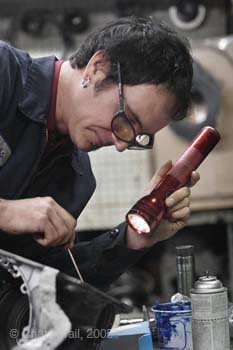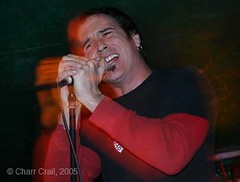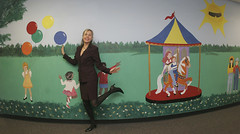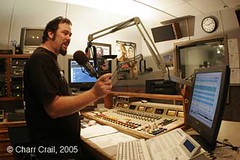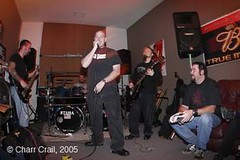Chris Cary leads a very complicated life as he winds his way through the many jobs he holds. To some he’s known as “Chris, the mechanic”. To others he’s known as lead singer and songwriter for his band Call Box. Next is his work connection to Tesla where he is alternately known as bassist Brian Wheat’s personal assistant, roadie and bass tech. And soon he’ll be known as the studio manager at J Street Recorders, a job he just recently took over. It’s a helluva schedule and he’s a popular guy. Hang around Chris for awhile and it’s easy to see why. He’s talented, professional, hard-working, articulate, gracious, good looking and well liked by everyone.
Catch Cary by day and you’ll find him at Nor Cal Transmission where he rents a bay and works on cars for his steady and dedicated clientele. Though this may not be his favorite of the many jobs he has he happens to be good at it and it serves him well in his double life. He got into auto mechanics as a teenager after he blew out the motor of the very first car he ever owned within a week. His dad’s response was if he wanted to continue driving that car he’d have to learn how to fix it himself. Cary’s first job was to rebuild that motor, which he did with the help of a neighborhood friend. Next thing you know his friends started asking him to fix their cars too. It even got him into car racing including a stint as a pit mechanic on the modified midget race cars where he worked with World Outlaws racing and toured with the 410 and 360 sprint cars. “It was a lot of fun” says Cary, We got to travel all over California, race, get into fights in the pit area. People would cut you off in the race track, or do something another race driver may feel was offensive, and it just full on breaks out and you’ve got eight people on eight people. Not that often but it happened.” he says with a Cheshire Cat grin.
The racing days are over but his mechanical skills now serve him in an entirely different arena– Music, his first love, his true passion. Asked if they cross over he says yes. “I did (mechanic) trade for all my head shots for the band. When we recorded Mixed Friction at Pus Cavern I did work on their vehicles and did trade for recording time. As far as the studio goes myself and Brian (Wheat) and some others built that studio from the ground up, from the dirt to where it is now– a 5000 sq ft state-of-the art studio and since I did that the whole album is paid for.”
The mechanical skills also come in handy if anything breaks down while traveling on the road with Tesla.
He became involved with Tesla four years ago when a former Mixed Friction band mate introduced Cary to bassist Brian Wheat when they were looking for a producer. It was a turning point. “I knew he was building this studio so I said well, if you ever need help I can do other things and he said ‘then get your butt out here. If you want you can work off your album’ and we just got to be really really good friends through that process. One of the dearest friends I have.
It was with some hesitation that Cary began touring with Tesla because he was in mid-production of his CD but in June when Brian’s bass tech got sick Cary came to the rescue and “just never went back home.” “Yeah it’s a blast, just this last leg alone we had three days off in Chicago and I got to see the Chicago Art Museum. Cary says that seeing a Monet and a Salvador Dali was one of the highlights of his trip. They even took a jaunt to Little Big Horn along the way. Cary says Tesla is unlike touring with a lot of bands. “A lot of bands are all about partying. Tesla is done with all that so on our days off we sight see. It’s cool, you don’t feel like you wasted a day because you just drank it all away. You went out and experienced a piece of life. Life is good right now.”

